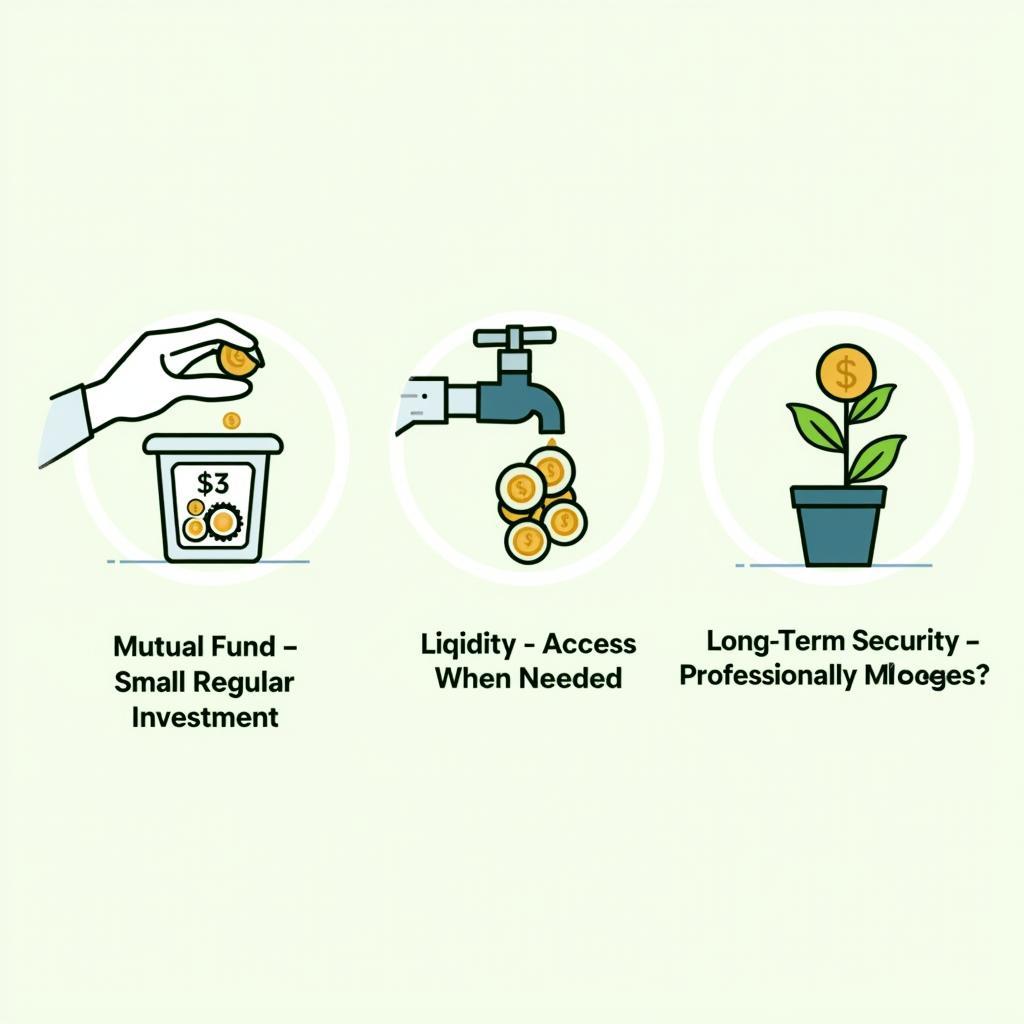The topic of investing in mutual funds has gained significant traction in recent IELTS Writing Task 2 examinations. Based on an analysis of past exam trends and current financial literacy initiatives globally, it’s highly likely that this subject will continue to appear in future tests. Let’s explore a relevant question that has been featured in recent IELTS exams:
{width=1024 height=1024}
Some people believe that investing in mutual funds is the best way to secure one’s financial future, while others argue that there are better investment options. Discuss both views and give your own opinion.
Analyzing the Question
This question requires candidates to:
- Discuss the advantages of investing in mutual funds
- Explore alternative investment options
- Provide a balanced argument
- Present a personal opinion with supporting reasons
Now, let’s examine sample essays for different band scores, starting with a high-band response.
Sample Essay 1 (Band 8-9)
In today’s volatile economic climate, securing one’s financial future has become a paramount concern for many individuals. While some advocate for mutual funds as the optimal investment vehicle, others contend that alternative options offer superior returns. This essay will examine both perspectives before presenting my own viewpoint.
Proponents of mutual funds argue that these investment tools provide a balanced approach to wealth accumulation. Mutual funds offer diversification, allowing investors to spread their risk across various securities, thereby mitigating potential losses from any single investment. Moreover, professional fund managers oversee these portfolios, leveraging their expertise to make informed investment decisions. This is particularly beneficial for novice investors who may lack the time or knowledge to manage their own investments effectively.
{width=1024 height=1024}
On the other hand, critics of mutual funds point to alternative investment options that may yield higher returns. Real estate, for instance, can provide both rental income and capital appreciation over time. Similarly, individual stocks, when chosen wisely, have the potential to outperform mutual funds significantly. Entrepreneurs might argue that investing in one’s own business offers the greatest potential for financial growth, as it allows for direct control over the investment and its outcomes.
“
In my opinion, while alternative investment options can indeed offer higher potential returns, mutual funds remain an excellent choice for the majority of investors, especially those seeking long-term financial security. The key advantage of mutual funds lies in their ability to balance risk and reward effectively. By providing access to a diversified portfolio managed by professionals, mutual funds offer a level of security that is difficult to achieve through individual investments without substantial capital and expertise.
Furthermore, mutual funds are highly liquid, allowing investors to access their money when needed, unlike some alternative investments such as real estate. They also offer the flexibility to invest small amounts regularly, making them accessible to a wider range of investors. This accessibility, combined with their potential for steady, long-term growth, makes mutual funds a prudent choice for those looking to secure their financial future.
{width=1024 height=1024}
In conclusion, while alternative investment options may appeal to those seeking higher returns or more direct control over their investments, mutual funds offer a balanced, accessible, and professionally managed approach to long-term financial security. As with any financial decision, the best investment strategy will ultimately depend on an individual’s risk tolerance, financial goals, and personal circumstances.
The importance of mental health support in education is a critical topic that parallels the importance of financial education in securing one’s future. Just as mental health support equips students with tools for emotional resilience, financial literacy empowers individuals to make informed investment decisions, including those related to mutual funds.
Explanation of Band 8-9 Score
This essay demonstrates the characteristics of a high band score (8-9) for the following reasons:
- Task Achievement: The essay fully addresses all parts of the task, presenting a well-developed response with relevant, extended, and supported ideas.
- Coherence and Cohesion: Ideas are logically organized with clear progression throughout. Paragraphs are well-linked, and cohesive devices are used effectively.
- Lexical Resource: A wide range of vocabulary is used with flexibility and precision. Less common lexical items are used with full awareness of style and collocation.
- Grammatical Range and Accuracy: A wide range of structures is used accurately and appropriately, with only rare minor errors.
- Balanced Argument: The essay presents both sides of the argument clearly before offering a nuanced personal opinion.
- Relevant Examples: Specific examples (e.g., real estate, individual stocks) are used to support arguments.
- Sophisticated Language: Complex sentences and advanced vocabulary (e.g., “volatile economic climate,” “mitigating potential losses”) are used effectively.
Sample Essay 2 (Band 6-7)
Many people think that putting money in mutual funds is the best way to save for the future, but others say there are better ways to invest. In this essay, I will talk about both ideas and give my opinion.
People who like mutual funds say they are good because they spread out risk. When you buy a mutual fund, your money goes into many different stocks or bonds. This means if one company does badly, you don’t lose all your money. Also, experts manage mutual funds, so you don’t need to know a lot about the stock market to invest.
{width=1024 height=1024}
However, some people think there are better ways to invest. For example, buying a house can be a good investment because the value of houses often goes up over time. Some people also like to buy stocks directly because they can make more money if they choose good companies. Others think starting a business is the best way to make money grow.
In my opinion, I think mutual funds are a good choice for most people. They are safer than buying individual stocks because the risk is spread out. They are also easier to understand than starting a business. While buying a house can be good, it takes a lot of money to start, and you can’t easily sell a house if you need money quickly.
Mutual funds also let you start investing with small amounts of money, which is good for people who can’t save a lot at once. You can add more money over time, which helps your savings grow steadily.
{width=1024 height=1024}
To conclude, while there are other ways to invest, I believe mutual funds are the best choice for most people who want to save for the future. They offer a good balance of safety and potential growth, which is important for long-term financial security.
How urban planning can create more sustainable cities is another area where balanced approaches, similar to those in mutual fund investing, can yield significant long-term benefits. Just as mutual funds diversify risk, sustainable urban planning diversifies a city’s resources and resilience.
Explanation of Band 6-7 Score
This essay demonstrates the characteristics of a Band 6-7 score for the following reasons:
- Task Achievement: The essay addresses all parts of the task, though some aspects are covered more thoroughly than others.
- Coherence and Cohesion: There is a clear overall progression, but some cohesive devices are overused or under-used.
- Lexical Resource: An adequate range of vocabulary is used for the task, with some attempts at less common vocabulary.
- Grammatical Range and Accuracy: A mix of simple and complex sentence forms is used, with some errors that do not impede communication.
- Balanced Argument: Both views are presented, though the development of ideas is less thorough than in the Band 8-9 essay.
- Relevant Examples: Examples are provided, though they are less specific and detailed than in the higher band essay.
- Language Use: The language is clear but less sophisticated than in the Band 8-9 essay, with some repetition and simpler structures.
Key Vocabulary to Remember
- Mutual funds (noun) – /ˈmjuːtʃuəl fʌndz/ – An investment program funded by shareholders that trades in diversified holdings
- Diversification (noun) – /daɪˌvɜːrsɪfɪˈkeɪʃn/ – The practice of varying investments within a portfolio to limit exposure to any single asset or risk
- Volatility (noun) – /ˌvɒləˈtɪləti/ – A statistical measure of the dispersion of returns for a given security or market index
- Liquidity (noun) – /lɪˈkwɪdəti/ – The degree to which an asset can be quickly bought or sold in the market without affecting the asset’s price
- Portfolio (noun) – /pɔːtˈfəʊliəʊ/ – A collection of investments held by an individual or organization
- Risk tolerance (noun) – /rɪsk ˈtɒlərəns/ – The degree of variability in investment returns that an individual is willing to withstand
- Capital appreciation (noun) – /ˈkapɪtl əˌpriːʃiˈeɪʃn/ – An increase in the value of an asset over time
- Mitigate (verb) – /ˈmɪtɪɡeɪt/ – To make less severe, serious, or painful
- Prudent (adjective) – /ˈpruːdnt/ – Acting with or showing care and thought for the future
- Long-term financial security (phrase) – A state of being free from financial worry over an extended period
Conclusion
The topic of investing in mutual funds is likely to remain relevant in IELTS Writing Task 2 exams due to its global significance in personal finance. To prepare effectively, practice writing essays on related topics such as:
- The role of financial literacy in economic development
- Comparing traditional savings accounts with modern investment options
- The impact of technology on personal finance management
- The importance of retirement planning in an aging society
Remember to structure your essays clearly, use a range of vocabulary and grammatical structures, and provide relevant examples to support your arguments. We encourage you to practice writing an essay on the given topic and share it in the comments section for feedback and discussion. This active engagement will significantly enhance your IELTS Writing skills and prepare you for success in the exam.
{width=1024 height=1024}
Role of space exploration in scientific advancement offers an interesting parallel to the concept of diversification in mutual funds. Just as mutual funds spread risk across various investments, space exploration diversifies human knowledge and technological capabilities across multiple scientific disciplines.